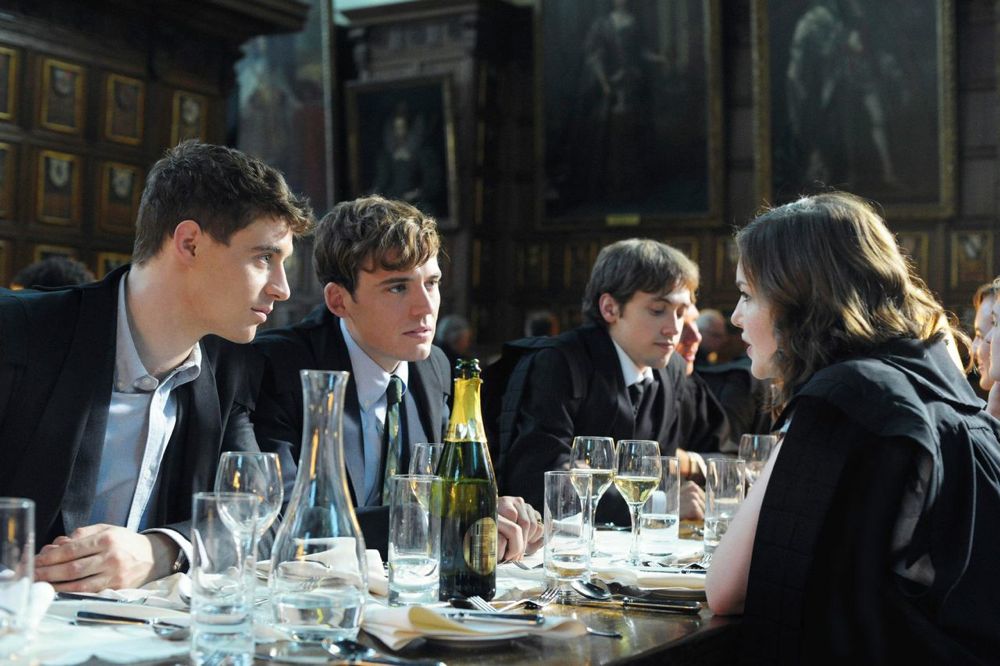Lone Scherfig’s Animal House
After two decades of writing and directing, there’s still something vibrant and youthful about Danish filmmaker Lone Scherfig. Her affinity for cinema has yet to subside, and it shows with The Riot Club—a raucous film revolving around a group of affluent college students who take part in the titular club.
Adapted from Laura Wade’s West End play Posh, the movie is a significant departure for Scherfig, often heralded for her delicate examinations of fledgling love and a gentile high society (see 2009’s An Education). Here, Scherfig abandons the posh pretense and dives headfirst into the morally bankrupt milieu of wealth at Oxford University. Our windows into this sordid universe are Miles Richard (Max Irons) and Alistair Ryle (Sam Claflin), two unassuming freshmen who quickly get seduced and corrupted by a mischievous coterie of trust-fund babies including Harry Villiers (Douglas Booth), Hugo Fraser-Tyrwhitt (Sam Reid), Dimitri Mitropoulos (Ben Schnetzer), and Toby Maitland (Olly Alexander).
The absence of ethics in The Riot Club is reminiscent of a nefarious and bloody Martin Scorsese gangster flick, a comparison Scherfig was elated by when she spoke to us at the Toronto International Film Festival. In our interview we spoke about the dangers of privilege, her college years, and why excess in England often goes uncontested.
SAM FRAGOSO: Your movie is very much about greed, and your characters maliciously play with and embody what it means to be greedy and entitled. Towards the end of the film, you have a character who says, “We don’t make mistakes.” Do you believe that? Do you feel these people can bypass repercussions because they’re wealthy and powerful?
LONE SCHERFIG: I think having access to the money and the power that you have if you are that privileged, yes. Because of the way you inherit land in England, because of the way—up until a couple of generations ago—[you] even inherit your place in the parliament. As he does in the film, you can hire the best lawyers. You can be forgiven by your own and still have a proper life even if you’ve made mistakes.
FRAGOSO: Is this more a matter of nature versus nurture? These people have grown up with money and these social attitudes. Is it their fault for not changing, or are they just a helpless product of their environment?
SCHERFIG: I hope this film gives a nuanced look into exactly that. It’s not just the fortunes they inherit; it’s also the access to the best possible schools, the right way of speaking, an instinct for how you do things. Especially in how others look at you. A big part of being posh in England is that you hide it in a quiet, specific way. You will make sure your car is small and dirty, and your dog is scruffy, and your pillows are so old and falling apart that they’re too posh to wash. People can read that. They have those little pockets all over the world where they make sure to be with people who are as privileged so they are not that exposed and they don’t feel singled out and lonely. I can’t say if it’s their fault, but I can say that if you have privilege you have an obligation to handle that responsibly. And some of them don’t. A lot of it is about ethics, values, and group dynamics. Miles, for instance, has a choice. He can walk away if he wants to. No matter how privileged or unprivileged you are, you always have a choice of walking away from something that is bad.
FRAGOSO: But there’s something alluring about it to these people.
SCHERFIG: It’s seductive.
FRAGOSO: And it’s not even just these people. I’m not sure how familiar you with the fraternity system in America.
SCHERFIG: But that’s kind of different, isn’t it?
FRAGOSO: To an extent, but there’s still wealth inherited, misogyny gone unnoticed, and a sort of groupthink that leads to violence.
SCHERFIG: I think some of the things you do in a club like that are things you do because you can do them. But I think the big difference is in the United States—I don’t know about Canada—most really rich people have made that money themselves, while in England it’s been inherited over a long, long time. And that you do have more of a social mobility.
FRAGOSO: Ideally there’s supposed to be more social mobility, but you see the same people and families wielding the money.
SCHERFIG: But that’s good, because for me being a foreigner my job is also to ensure that the film works for people who are not British. That you get a view into a very exotic world, but you can still identify even if you went into a different school in a different country.
FRAGOSO: There’s certainly some crossover. I think people will look at The Riot Club as a departure for you. The first half of the movie is reminiscent of An Education and One Day. Then it takes this unsettling, Wolf of Wall Street-like turn.
SCHERFIG: [smiles] I’m so proud to hear you say that… I absolutely adore Wolf of Wall Street. I hadn’t seen it then. We had a scene where someone was going to swallow a goldfish on camera and then I saw Wolf and thought, “Oh, we can’t do that.” Class is seductive, and I am as big a sucker for that as anyone else. What I was going to say about England when you asked, “Is it their own fault,” I think the middle class represented by the pub owner leaches onto that system. He’s part of it. Class is not just about the upper-class behavior. It’s also that everyone else stays where they are, and do not always question it as much they should in England. The wealthy are seductive. The Queen is wonderful, even if she’s one of the richest women in the world. The buildings are so beautiful. You only look at the architecture and the paintwork. And you don’t think, “Oh my god, these people that live inside made that money in India.”
FRAGOSO: It does seem your intention for this movie is to explore behind those fortresses.
SCHERFIG: I hope so. And I think in order to do it you have to seduce and have the characters seduced. The way Miles and Alistair, the two main characters, are seduced. For me it was an opportunity to do something that was more dynamic, more unpredictable, more insecure than what I’ve done previously. So I have an obligation to reinvent the film language with whatever that script would take. And this script takes something that is wilder and faster in the editing to a place where I haven’t been for a very long time.
FRAGOSO: You saw the play twice, correct?
SCHERFIG: Yes.
FRAGOSO: What grabbed you in it?
SCHERFIG: I could just sense that this had something nothing else had. The access to something that happens behind closed doors, and my fascination with them and they world they live in and the power they have at such a young age.
FRAGOSO: Did you experience or witness any of that behavior when you were in college?
SCHERFIG: No, because that was in Denmark and it was totally social-democratic. In those years we had the smallest difference between the richest and the poorest people in the entire world. I don’t come from that at all, but it’s all the more fascinating to me.
THE RIOT CLUB IS CURRENTLY SCREENING AT THE TORONTO INTERNATIONAL FILM FESTIVAL.







